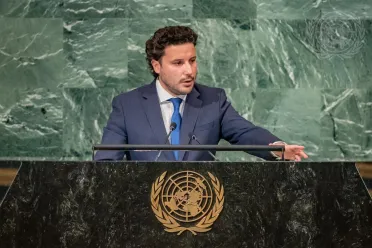Statement
Statement summary
DRITAN ABAZOVIĆ, Prime Minister of Montenegro, pointing out that the world “walks from one crisis to another” – from the COVID-19 pandemic to another war — underscored that his country’s position on Russian aggression against Ukraine is simple: “We stand with the people of Ukraine”. He recalled that his country — along with others in the region — knows much about humanitarian and refugee crises, ethnic conflict and the use of military force. However, he stressed that, in the twenty-first century, “humanity should be smarter”, and that war should not be used to solve political problems. For its part, Montenegro will continue to support Ukraine and follow European Union policy in this regard in its entirety, including sanctions against the Russian Federation. Underlining that this is not a question of economics — but of principles — he said that, while today witnesses aggression in Ukraine, tomorrow it could be some other State that is attacked. Montenegro has received 10,000 refugees from Ukraine — which, given its size, is equal to around 2 per cent of its population — and it will continue to open its doors to those in trouble. “They are welcome,” he said.
Turning to another crisis — that of energy — he said that, while today this crisis was one of economics, tomorrow it could be one of security. While the war in Ukraine has destabilized the energy market and caused prices to soar, climate change is also stoking this problem. He emphasized the need to solve this issue for future generations, pointing out that his country is the only one that, by its Constitution, is a “dedicated ecological State”. It seeks to be a green destination — the water from the river in northern Montenegro is still potable — and the international community must similarly protect nature, promote green projects and address pollution. This is not just a question for one country and, without international solidarity in this regard, a bigger problem lies ahead.
He went on to highlight the importance of transitional justice, recalling past conflict and ethnic strife in the Western Balkans. While Montenegro is trying to build a modern European society, this is impossible without transitional justice. “There are two types of peace,” he continued — negative and positive — noting that the former is represented by a lack of conflict, but the existence of weak, politicized institutions. Montenegro desires more positive peace in the region, which means establishing independent institutions and combatting organized crime and nationalism. Noting his country’s efforts to fight organized crime – which, being transnational in nature, is not only a problem for Montenegro – he detailed Government actions against the smuggling of cigarettes and cocaine. Corruption lies behind the nationalism in the Western Balkans, and fighting it will lead to less tension and more economic progress.
On Montenegro’s foreign policy, he noted that his country made a good decision to join NATO in 2017, given the crisis currently unfolding. However, he stated that his country’s desire to join the European Union was even greater — emphasizing that Montenegro “wants to be a part of the big European family” — and that it would do everything to achieve this as soon as possible. “The Western Balkans should not be the black hole of Europe,” he said, also spotlighting his country’s efforts to build bridges in the region. Montenegro desires Serbia and Kosovo to find common agreement, Bosnia and Herzegovina to find internal agreement and for all States in the region to be productive. It does not, however, want to be successful while its neighbours are not; rather, the States of the Western Balkans should be successful together.
“Deglobalization is not sustainable,” he stressed, and the problem of one country can easily become the problem of another. As such, solutions must be found together and, for its part, Montenegro will always be a partner in initiatives to create peace, progress and stability. The international community must work to promote more ethics in global politics and less populism; more concrete action and less rhetoric; and more justice and less support for authoritarian regimes around the world, he said. Also underscoring the need to preserve democracy, he stressed that no one could say “it’s not important for me”, as every voice is needed to advocate for democracy and universal values.
Full statement
Read the full statement, in PDF format.
Photo

Previous sessions
Access the statements from previous sessions.
